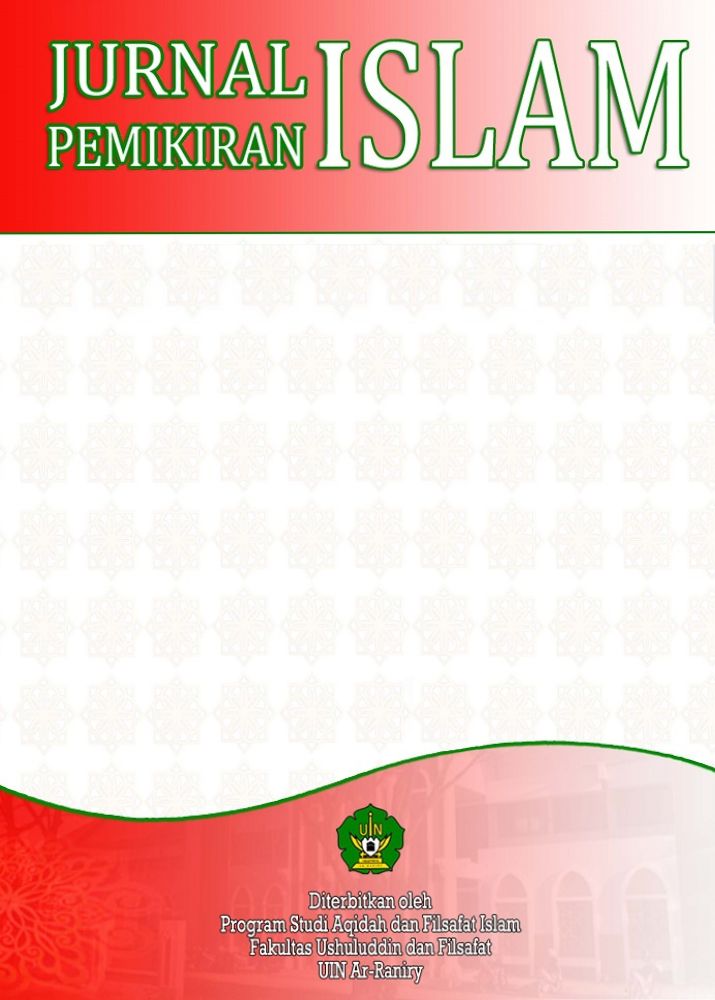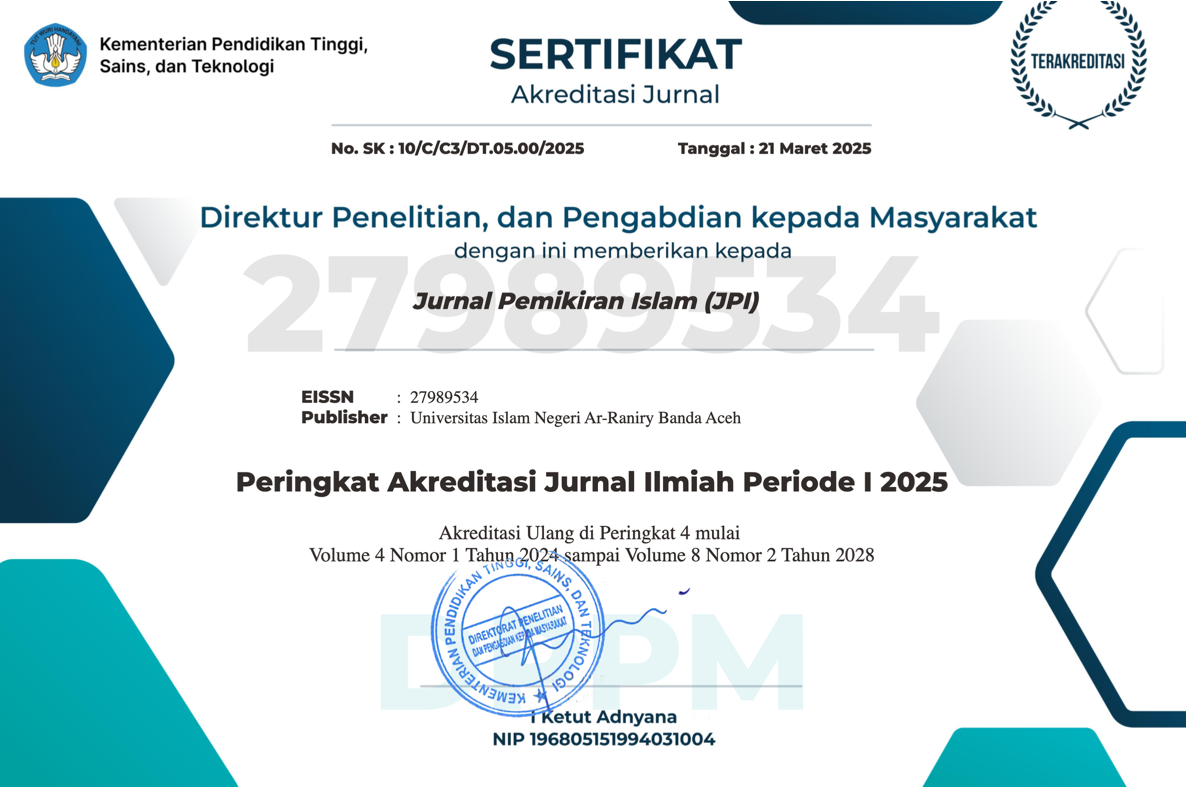Qur’anic Perspectives on Mustadh‘afin: Gendered Oppression and Women’s Empowerment in Contemporary Indonesia
DOI:
https://doi.org/10.22373/jpi.v5i1.31644Keywords:
Mustadh‘af, Women, Gender, Indonesia, Oppression, EmpowermentAbstract
This article investigates the forms of mustadh‘afin (systemic oppression) experienced by women, as reflected in selected Qur’anic verses, and analyzes their relevance to the realities of contemporary Indonesian society. Filling a gap in previous scholarship, which often separates gender analysis from Qur’anic interpretation, this study adopts a gender-aware thematic approach (tafsir maudhu‘i) and draws on both classical and contemporary exegesis, including Al-Kassyaf, Tafsir Ibn Kathir, Al-Maraghi, and Al-Misbah. The analysis focuses on QS. An-Nisa [4]: 75, 97, 98; QS. Al-Anfal [8]: 26; and QS. Al-Qashash [28]: 4–5, all of which frame mustadh‘afin as a condition produced by structural marginalization, limited access to rights, and deep-seated gender stereotypes. In present-day Indonesia, such patterns of isti‘dhaf manifest through educational inequality, the dual burden of domestic and public responsibilities, victim blaming, and the commodification of women’s bodies. The study proposes empowerment strategies based on Qur’anic principles, including spiritual and social hijrah, gender literacy, and inclusive reinterpretation of both texts and policy. By integrating gender-sensitive exegesis with the lived experiences of Indonesian women, this article offers a new framework for Qur’anic gender discourse and supports structural transformation rooted in Islamic justice.
Downloads
References
Abdelgafar, B. I. (2024). Re-envisioning Women’s Empowerment: A Maqasid Approach to Understanding Women’s Status and Rights in Islam. In Gulf Studies (pp. 55–73). Springer Nature Singapore. https://doi.org/10.1007/978-981-99-6006-4_3
Abha, M. M. (2014). Kajian Kritis Atas Kitab Al-Tafsir Al-Tawhidi Karya Hasan Al-Turabi. Jurnal Studi Ilmu-Ilmu Al-Qur’an Dan Hadis, 15(1), 39. https://doi.org/10.14421/qh.2014.1501-03
Ahmad, Md. A. (2022). Feminisme Islami: Suatu Kritikan Terhadap Faham Keadilan Musawah. Jurnal Akidah & Pemikiran Islam, 24(1), 1–32. https://doi.org/10.22452/afkar.vol24no1.1
Aini, S. N., & Mayasari, D. (2022). Marginalisasi Gender dalam Berita Online Kasus Pelecehan Seksual Terhadap Mahasiswi. Journal of Education Research, 3(4), 199–207. https://doi.org/10.37985/jer.v3i4.123
Alamsyah, R. P., & Lintang, D. (2025). Cultural Integration and Political Consciousness in Qur’anic Exegesis: A Study of the Tafsīr Al-Qur’ān Al-Karīm by Binjai’s Ulama Tiga Serangkai. Fikri : Jurnal Kajian Agama, Sosial Dan Budaya, 10(1), Article 1. https://doi.org/10.25217/jf.v10i1.6161
Al-Maraghi, A. M. (2007). Tafsir Al-Maraghi (Tafsir, Vol. 5). Musthofa Al-Bab Al-Halbi.
Alwi, M., Rusdi, M., Abubakar, A., & Ilham, M. (2022a). Al-Mustadh’afin: Reflection of the Qur’an on Social Inequalities. FITRAH: Jurnal Kajian Ilmu-Ilmu Keislaman, 8(2), 327–344. https://doi.org/10.24952/fitrah.v8i2.5633
Alwi, M., Rusdi, M., Abubakar, A., & Ilham, M. (2022b). Al-Mustadh’afin: Reflection of the Qur’an on Social Inequalities. FITRAH: Jurnal Kajian Ilmu-Ilmu Keislaman, 8(2), 327–344. https://doi.org/10.24952/fitrah.v8i2.5633
Al-Zubaydī, M. M. al-Ḥusayn. (1984). Tāj al-‘Arūs min Jawāhir al-Qāmūs. Kaherah: Dār al-Hidāyah.
Ariziq, B. L. (2022). Kedudukan Dan Kondisi Wanita Sebelum Dan Sesudah Datangnya Agama Islam. Jurnal Keislaman, 5(1), 1–12. https://doi.org/10.54298/jk.v5i1.3398
Azizah, N. (2021). Kedudukan Perempuan Dalam Sejarah Dunia Dan Islam Berkesetaraan Gender. SETARA: Jurnal Studi Gender dan Anak, 2(2), 21. https://doi.org/10.32332/jsga.v2i2.1911
Az-Zamakhsyari, A. A.-Q. M. ibn U. (1998). Al-Kassyaf ’an Haqaiq Ghawamidh At-Tanzil wa ’Uyun Al-Aqowil fi Wujuh At-Ta’wil (Tafsir Al-Qur’an, Vol. 2). Maktabah Al-’Abikan.
Az-Zubaidi, M. M. A.-H. (1990). Tajul ’Arus min Al-Jauhar Al-Qamus (Qamus Al-’Arabi, Vol. 24). Mathbah Al-Hukumah.
Barlas, A. (2001). The Qur’an and Hermeneutics: Reading the Qur’an’s Opposition to Patriarchy1. Journal of Qur’anic Studies, 3(2), 15–38. https://doi.org/10.3366/jqs.2001.3.2.15
Connell, R. (2005). Masculinities (2nd ed.). University of California Press.
Elpandari, W. A., Hamid, A. R., Sudarman, & Akmansyah, M. (2025). Setara Tetapi Berbeda: Tantangan Perempuan Di Era Kontemporer Dalam Pemikiran Murthada Muthahari. Pendas: Jurnal Ilmiah Pendidikan Dasar, 10(2), 283–297.
Gupta, G. R., Oomman, N., Grown, C., Conn, K., Hawkes, S., Shawar, Y. R., Shiffman, J., Buse, K., Mehra, R., & Bah, C. A. (2019). Gender equality and gender norms: Framing the opportunities for health. The Lancet, 393(10190), 2550–2562.
Hamid, H. B. binti A. (2021). Exploring Victim Blaming Attitudes in Cases of Rape and Sexual Violence: The Relationship with Patriarchy. Malaysian Journal of Social Sciences and Humanities, 6(11), 528095. https://doi.org/10.47405/mjssh.v6i11.1147
Ibn Katsir, I. ibn U. (1997). Tafsir Al-Qur’an Al-Adzim (Tafsir Al-Qur’an, Vol. 2). Daar Thayyibah Li An-Nasyir wa At-Tauzi’.
Ibrahim, C. (2020). Women and Gender in the Qur’an. Oxford University Press.
ILO Homepage | International Labour Organization. (n.d.). Retrieved July 23, 2025, from https://www.ilo.org/
Kanya Eka Santi. (2024). Power Abuse in Child Sexual Abuse in Indonesia. Asean Social Work Journal, 12(2). https://doi.org/10.58671/aswj.v12i2.109
Komnas Perempuan, K. P. (2024). Lembar Fakta: Catatan Tahunan Komnas Perempuan Tahun 2023 – “Momentum Perubahan: Peluang Penguatan Sistem Penyikapan di Tengah Peningkatan Kompleksitas Kekerasan terhadap Perempuan”. Komisi Nasional Anti Kekerasan terhadap Perempuan.
Mernissi, F. (1982). Virginity and patriarchy. Women’s Studies International Forum, 5(2), 183–191. https://doi.org/10.1016/0277-5395(82)90026-7
Mitra, A., Bang, J. T., & Biswas, A. (2015). Gender Equality and Economic Growth: Is it Equality of Opportunity or Equality of Outcomes? Feminist Economics, 21(1), 110–135. https://doi.org/10.1080/13545701.2014.930163
Munir, A., Am, H., & Bahauddin Am, A. (2024). Breaking The Boundaries of Patriarchy: Elaboration of The Pillars of Modern Islamic Thought on Women’s Leadership. Journal of Islamic Studies and Humanities, 9(2), 153–175. https://doi.org/10.21580/jish.v9i2.21953
Ni’mah, N. J., Anggani, R. F., Fitria, S. N., & Najichah, A. F. (2024). Peran dan Kontribusi Pendidikan Agama Islam dalam Pemberdayaan Perempuan di Lingkungan Masyarakat. Al-Aulia: Jurnal Pendidikan dan Ilmu-Ilmu Keislaman, 10(1), 37–48. https://doi.org/10.46963/aulia.v10i1.1854
Rochmah, P. I., & Nurhalizah, M. E. (2024). Women’s Empowerment Through Da’wah Bil Hal: Strategies Towards Sustainable Development in the Modern Era. International Journal of Islamicate Social Studies, 2(2), 79–90. https://doi.org/10.62039/ijiss.v2i2.73
Rozi, F., Andrian, M. S., & Abdul Majid. (2024). Mustad’afin dalam Al-Qur’an: Studi Tematik Atas Penafsiran Buya Hamka. PUTIH: Jurnal Pengetahuan Tentang Ilmu Dan Hikmah, 8(1), 65–84. https://doi.org/10.51498/b6jctc44
Saiful, T., Yaswirman, Yuslim, & Fendri, A. (2020). Gender Equality Perspective and Women Position in Islam. Proceedings of the International Conference on Law, Governance and Islamic Society (ICOLGIS 2019). International Conference on Law, Governance and Islamic Society (ICOLGIS 2019), Banda Aceh, Indonesia. https://doi.org/10.2991/assehr.k.200306.212
Sakina, A. I., & A., D. H. S. (2017). MENYOROTI BUDAYA PATRIARKI DI INDONESIA. Share: Social Work Journal, 7(1), 71. https://doi.org/10.24198/share.v7i1.13820
Shihab, M. Q. (2002). Tafsir Al-Misbah (Pesan, Kesan, dan Keserasian Al-Qur’an) (Tafsir Al-Qur’an, Vol. 2). Lentera Hati.
Sholehah, I. (2018). Keberpihakan Al-Qur’an Terhadap Mustaḍ’afīn. Living Islam, 1(1), 51–67.
Wadud, A. (2021). Reflections on Islamic Feminist Exegesis of the Qur’an. Religions, 12(7), Article 7. https://doi.org/10.3390/rel12070497
Downloads
Published
Issue
Section
License
Copyright (c) 2025 Nina Sari Siregar, Nur Aisah Simamora

This work is licensed under a Creative Commons Attribution-NonCommercial-ShareAlike 4.0 International License.
Authors who publish in Jurnal Pemikiran Islam agree to the following terms:
- Authors retain copyright and grant the journal right of first publication with the work simultaneously licensed Attribution-NonCommercial-ShareAlike 4.0 International (CC BY-NC-SA 4.0) that allows others to share the work with an acknowledgment of the work's authorship and initial publication in this journal.
- Authors are able to enter into separate, additional contractual arrangements for the non-exclusive distribution of the journal's published version of the work (e.g., post it to an institutional repository or publish it in a book), with an acknowledgment of its initial publication in this journal.
- Authors are permitted and encouraged to post their work online (e.g., in institutional repositories or on their website) prior to and during the submission process, as it can lead to productive exchanges, as well as earlier and greater citation of published work. (See The Effect of Open Acces)















